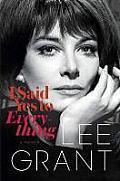Say Yes to Everything
I SAID YES TO EVERYTHING: A MEMOIR by Lee Grant 
I didn’t even know how much I loved Lee Grant until I read this book.
Of course, I knew I liked her or thought she was cool, otherwise I would have looked over her autobiography, but all I knew about the girl was that she was amazing in In The Heat of the Night and I’m incredibly interested in basically any of the girls who were in The Valley of the Dolls.
And if that’s all you know about Lee Grant right now – believe me, this lady is way cooler than that.
Lee Grant wasn’t always Lee Grant. She was born, in a year frequently tinkered with on passports and driver’s licenses, as Lyova Haskell Rosenthal, but of course, that’s not a name to get the good roles with. The story starts with adorable insights into her girlhood, my two favorite being 1) being called precocious by adults and being so flattered because she thought they meant precious, and 2) having her first love as a child, only to see it end when her mother forced her to wear this certain dress.
Of course, it starts getting good when Lee breaks off on her own. She leaves the home of her parents and moves straight in with a man about 10 years her senior, already a father of three and already a suspected communist during the McCarthy era. Being a young actress linked to a suspected communist would have been, of course, death to a career, which makes it all the more fascinating that we still care about Lee Grant today.
After a suspect commie dies under circumstances that look very much like he was pushed to an untimely death by investigators, Lee says this at his funeral, and for the next 12 years, puts the nail in the coffin of her career. No one would hire her; there was no point going to auditions. In one story, Lee remembers getting a call from a young girl asking her to come audition, to which Lee replies she must be mistaken, the girl looks at her lists again, and apologizes, they have no work for her.
Was America really like this? Today, celebrities can spew off speeches of hate towards Obama and nothing prevents their next role.
When Lee’s name is finally cleared 12 years later, when the offers are finally coming in, it’s the parts of 20-somethings that people are interested in. So, in this time before IMDb, before the internet, she went lied about her birthday, claiming to the officials they’d made a grave error, marking her a ten years older than she was.
I swear it seems like I’m writing a review of a piece of fiction, like this is some story of a girl that’s too improbable to be true, too literate to be real life. I suppose that’s a bit of what I Said Yes to Everything feels like.
The blacklist lifted, Lee shares the details (and the dirt) of the movies she’s worked on, the directors and stars she’s worked with, the successes and the failures. She’s got a refreshing honesty – admitting the parts she took for money, admitting her own stubbornness looking back on events.
Actually, that’s one of the things I admire about this book most. As Lee says: “I write not anticipating what I’ll say. Sandy Meisner said, ‘Don’t anticipate, surprise yourself.’” And truly – Lee’s the first to admit the things that surprise her as she recounts. So many sentences start with “looking back,” and end with Lee coming to self-realizations of her own behaviors.
As she grew older, maturing in the industry, Lee couldn’t help but try her hand at directing, and I’m so glad she did. It’s probably a really insignificant part of her story for most, but I was intently drawn to her telling of the first documentary she’d directed, a film called Willmar 8 that captured the strike carried out by 8 Minnesotan women who had spent years teaching and training young men that would soon become their own bosses (when they confronted their boss on this, his response was “You are women, after all.”) It’s really a fantastic story of feminism and strong women, and, Willmar being my hometown (as well as the hometown of Lee Grant’s best friend), it’s a story I’ve only heard a different side of in school. I’d love to say the strikers were now revered as heroes, that the groundbreaking strike and the exposure from Lee’s film changed the landscape of women in the workplace in Willmar, but…
Can I keep going on and on over every insight shared by Lee, every detail of this story that stuck to me? It’s in the hundreds. I’m amazed at the honesty, the heart and humility found in I Said Yes to Everything, and I’m sure you will as well. If you’re not a Lee Grant fan already, read this, and you will be.





